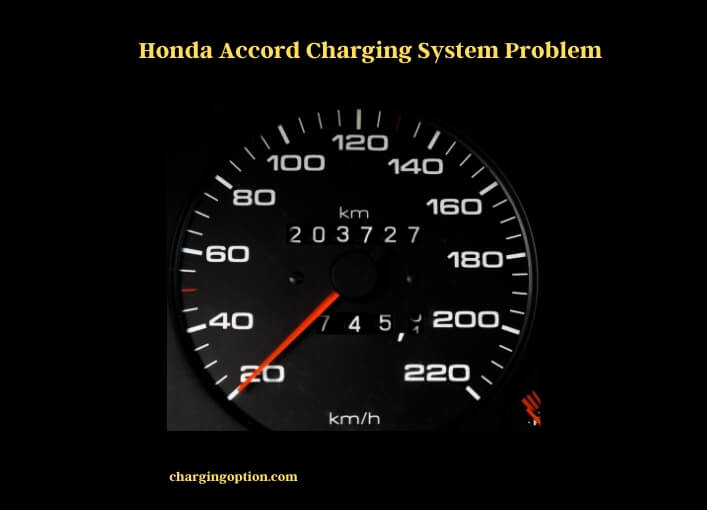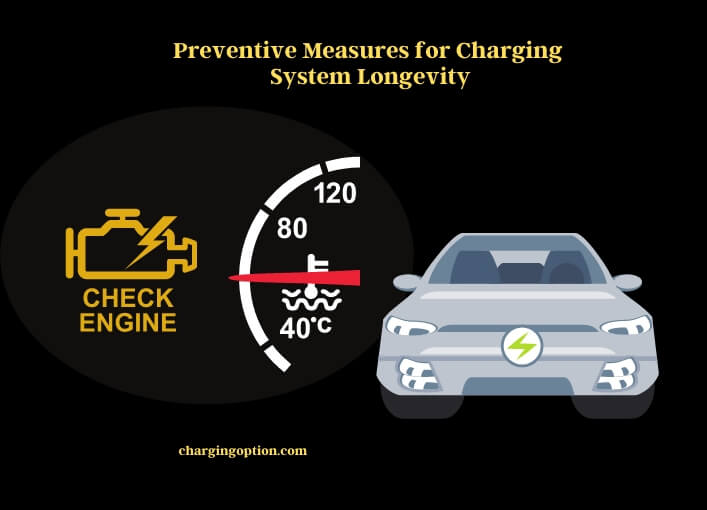The Honda Accord is known for experiencing charging system problems, particularly in the models produced during the years 2014, 2016, 2019, and 2020. If your vehicle displays a charging system warning light, it indicates an issue with the electrical charging system or that the ignition switch has been turned on without the engine running. Ignoring this warning light could potentially lead to serious problems, so immediate attention is required.
In the 2014 Honda Accord, there was a notable charging system recall due to the risks it posed. For the 2016 model, similar issues were reported, highlighting the importance of regular maintenance checks on these models. The more recent 2019 and 2020 Honda Accord models were not immune to this issue. Many owners reported charging system problems, underscoring the necessity of proper care and attention to this vital component of the vehicle.

Interestingly, it’s not just the Accord line that has faced these issues. The Honda Odyssey has also had its share of charging system problems. For Honda Accord Hybrid owners, problems with the 12-volt battery charging system have been reported, adding an extra layer of complexity to the issue.
If the charging system warning light illuminates while you’re driving, it is essential to stop and verify if the alternator belt is loose or broken. If this light remains stubbornly lit, knowing how to reset the ‘check charging system’ light on your Honda Accord is crucial. This resetting procedure can serve as a temporary solution, but remember, it’s always wise to get the charging system examined by a professional mechanic to prevent further damage or inconveniences down the road. Regularly checking the status of your charging system and acting promptly on any warning signs can help you enjoy a smooth and uninterrupted journey with your Honda Accord.
Honda Accord Charging System: Key Components
Let’s take a closer look at the integral parts of the Honda Accord charging system:
Battery
The battery is the reservoir of electrical energy for your Honda Accord. It stores the energy needed to start your car and powers all electrical systems when the engine is off. Regular maintenance and timely replacement are crucial to keep your battery in good shape.
Alternator
The alternator, attached to the engine, converts mechanical energy into electrical energy, which it then uses to recharge the battery. The alternator also powers your car’s electrical systems while the engine is running.
Voltage Regulator
This essential part of your charging system ensures the alternator provides the right amount of voltage to your car’s electrical systems and to recharge the battery. Without it, the alternator could overcharge and damage the battery or supply inadequate power, affecting the performance of the electrical systems.
Ignition Switch
The ignition switch controls the power supply to your car’s various electrical systems. It initiates the entire electrical process the moment you turn your car on.
Roles and Functions of Charging System Components
| Component | Function |
| Battery | Stores electrical energy and powers the car’s electrical systems |
| Alternator | Generates electrical energy and charges the battery |
| Voltage Regulator | Regulates the voltage supplied by the alternator |
| Ignition Switch | Controls the power supply to the car’s electrical systems |
Symptoms Indicating Charging System Problems
Certain signs could indicate issues with your Honda Accord’s charging system:
Activation of Warning Light
A warning light on your dashboard is the first sign something might be wrong. The light typically appears if the alternator isn’t charging the battery properly.
Rapid Battery Drainage
If your battery discharges quickly, it could mean your alternator isn’t working correctly, or your battery needs replacing.
Inconsistent Electrical Component Performance
Electrical components, like headlights and dashboard lights, may dim or fluctuate in brightness. This irregular performance can indicate an issue with the charging system.
Engine Starting Issues
Having trouble starting your car could be a symptom of a charging system problem. It might be related to a faulty battery, alternator, or ignition switch.
Diagnosing Charging System Problems
Identifying what’s causing your Honda Accord’s charging system problems is the first step in the repair process.
Inspecting the Battery
A simple battery test can tell you if your battery is the issue. A multimeter can measure the battery voltage and give you insight into its condition.
Examining the Alternator
You can check the alternator belt for looseness or breakage. Also, a multimeter test can help you determine whether your alternator is generating the right amount of voltage.
Testing the Voltage Regulator
You can measure the voltage with your car running to check if the voltage regulator is functioning properly. A significant deviation from the normal voltage indicates an issue with the voltage regulator.
Verifying the Ignition Switch
If your car accessories are not functioning as expected or you have trouble starting the car, it can point to a problem with the ignition switch.
Steps for Diagnosing Common Charging System Problems
| Issue | Diagnostic Steps |
| Battery Problems | Checking battery terminals, Testing battery voltage |
| Alternator Failure | Checking alternator belt, Measuring alternator output |
| Voltage Regulator Malfunction | Testing voltage with car running, Observing headlight brightness |
| Ignition Switch Issues | Verifying functionality of car accessories, Checking starter circuit |
Fixing Honda Accord Charging System Problems
After determining the source of your charging system problem, it’s time to resolve it.
Replacing the Alternator
If your alternator is faulty, you’ll need to replace it. This process involves disconnecting the battery, removing the old alternator, and installing the new one.
Changing the Battery
If your battery is the issue, you’ll have to replace it with a new one. This task involves removing the old battery and installing the new one, ensuring the terminals are clean and securely connected.
Fixing the Voltage Regulator
In some cases, the voltage regulator can be replaced separately from the alternator. Be sure to disconnect the battery before starting this process.
Resolving Ignition Switch Issues
Ignition switch problems may require professional assistance, as it involves dealing with intricate electrical circuits. It’s best to let a certified mechanic handle this repair.
Preventive Measures for Charging System Longevity
To prevent future charging system problems, follow these tips:
Regular System Inspection
Frequent inspection can help identify potential problems before they cause significant issues. It’s good to check your battery, alternator, and voltage regulator regularly for any signs of wear or damage.

Caring for the Battery
Keeping the battery terminals clean and ensuring the battery is securely mounted can prolong its life. It’s also a good idea to replace your battery every 3-5 years, or as recommended by your car manufacturer.
Maintaining the Alternator
Regular checks for wear and tear, along with avoiding overloading the electrical system, can help your alternator last longer.
Regular Voltage Regulator Checks
Periodic voltage tests can help identify if your voltage regulator is performing optimally. Protecting your car from excessive heat can also help prolong the life of your voltage regulator.
Preventive Measures for Prolonging Component Lifespan
| Component | Preventive Measures |
| Battery | Regular cleaning, Timely replacement |
| Alternator | Regular inspection, Avoiding overloading |
| Voltage Regulator | Regular testing, Protecting from heat |
| Ignition Switch | Regular functional checks, Professional servicing |
References
For more detailed instructions on how to manage and troubleshoot your Honda Accord’s charging system, the Honda Accord Owner’s Manual is a valuable resource. It contains specific information tailored to your vehicle model. Moreover, Honda Technical Service Bulletins provide professional advice and solutions for common problems encountered by Honda Accord owners.
Additional Resources
For an even deeper knowledge on the topic, consider these resources:
- YourMechanic – Charging System Inspection provides detailed insights on what a charging system inspection entails, guiding you on how to carry it out effectively.
- CarCareKiosk – Honda Accord Battery Replacement Video is a practical video tutorial that takes you through the process of replacing the battery of a Honda Accord.
- ItStillRuns – How to Test a Honda Alternator provides a step-by-step guide on testing your Honda’s alternator, which can be invaluable in diagnosing charging system problems.
By taking the time to learn about your Honda Accord’s charging system, you’re taking a significant step towards becoming an informed vehicle owner. Remember, proper maintenance and timely repairs can extend the lifespan of your vehicle and save you from costly repairs in the future. And with the right knowledge and resources, you can keep your Honda Accord running smoothly for years to come.
Relevant Resources:
- Bose Sleepbuds 2 Won’t Charge: Reasons & Solution
- Comparing 32a and 40a Level 2 Chargers: A Closer Look
- Tackling the 2006 Honda Civic Hybrid Battery Charging Issue
- Solving 2022 Silverado’s Wireless Charging Issue
- Does Advance Auto Parts Charge Batteries for Free?
- Recharging Options for Your Fiat 500e: Home, Work, and Beyond
